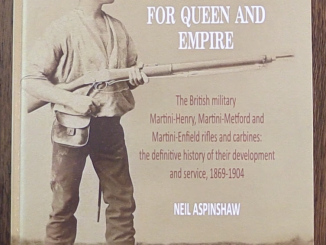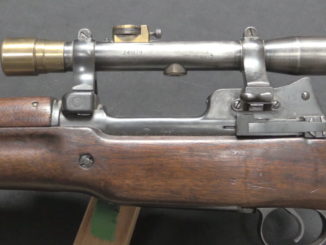Get your copy here: https://amzn.to/2HT1wyC or here: https://amzn.to/2JOpMm3
The Wipers Times was a satirical trench newspaper printed from February 1916 until December 1918 by British Captain F.J. Roberts and a crew of assistants. Such papers were not particularly uncommon, but the Wipers Times was particularly successful, well written, and long-lived, and it has survived in reprints today to a greater extent than any other similar work. A total of 23 issues were printed, and they consist of poetry, commentary, mock advertisements, advice columns, and short stories. While much of the humor is still quite accessible to us today, much of it also includes references, abbreviations, and inside jokes that are inscrutable to those who are not quite knowledgeable about life in the trenches.
Roberts and his cohorts were legitimate front-line soldiers, not writing as visiting journalists or from the safety of the rear echelons. Beyond its basic entertainment value, their writings also provide a rare and interesting view into the minds of men who were truly living the Great War.
Not that a book about the newspaper has also been printed, titled “The Wipers Times”, and with a very similar cover. If you want to buy a copy of the reprinted original issues, make sure you are not buying that book.
The BBC made a 90 minute program based on the Times, which is available in its entirely on YouTube here:
https://www.youtube.com/watch?v=SKPXum4Va7k




Great review, Ian. As always, most interesting. I watched a bit of the BBC video and I was immediately struck by the fact that Capt. Roberts was in the Nottingham and Derbyshire Regiment, The Notts and Derbys, or as they preferred, the Sherwood Foresters.
My uncle, Pvt John Joseph Ryan, was in the 2nd Battalion of the Sherwood Foresters and was killed April 1, 1915, at Vimy Ridge. He was 17. He was from Birr, Ireland and went to England seeking work, then joined up in 1914. My grandmother used to tell the story of the day the telegram arrived at their little house and a few weeks later a small box of his belongings. Two years later my grandmother’s uncle, Joe Melsop, a Sgt in the Leinster Rgt was killed in France. A lot of sadness those years in that small town. Birr was a Barracks town for the Leinster (‘Prince of Wales own”) regt. Before 1922, the regiment was largely recruited in Ireland. Disbanded after 1922.
The Sherwood Foresters have a long history as well. I believe Queen Victoria gave them permission to use the sobriquet “Sherwood Foresters,” but they, too, no longer exist; merged with other regiments a few years back. They do have a memorial and roll of honor at the Derby County museum.
I have been able to locate burial sites for both men, and I hope one day to visit. Sorry for being long-winded, but I do not often have a chance to share the story.
Cheers, and thanks for all of the great work you do and share with us.
Thank you Mr. Roach for posting that.
My Grandads brother was in the Leinster regiment: John Newell, from Portlaoise; he was killed in action in 1915 think it was at Ypres, somewhere/somehow.
He has a grave… Unlike a lot of people.
I had a good read of the Times illustrated history of the war in a T.A barracks in London, that was interesting (period books) I had never heard of these though- I bet they have more… Or give a more “true to life” impression of the times.
“give a more “true to life” impression of the times.”
Interested in topic of Royal Navy in Great War probably know that W.L.S.Churchill was First Lord of the Admiralty until 1915, when after failure at Dardanelles he was removed from that post. Some time later he decided to return to British Army, where he become commander of battalion, his action in that role are described in book titled With Winston Churchill at the Front written by Captain X.
“He has a grave… Unlike a lot of people.”
I don’t want to detract sacrifices of lives, but I must note that men which survived that conflict often get rather unpleasant experience after returning home, like: you are not longer working there.
http://firstworldwar.com/audio/stonybrokeinnomansland.htm
Aye… Poor do. War wasn’t a “good” idea really. The background is interesting, Franco Prussian lark (France in general, after Waterloo) all contributing factors… German unification clearly. Britain’s enlarged colonial possessions, Russias, soon to become very pressing need for change.
You wouldn’t think it would be possible nowadays for people to be so stupid, as to get into such a fight in the first place.
America’s post civil war, development etc, etc.
Interbred European Royalty is no guarantee of peace anyway, with hindsight Queen Vicky.
“Interbred European Royalty”
It is shown on image here: https://www.brookings.edu/blog/brookings-now/2013/12/20/the-family-relationships-that-couldnt-stop-world-war-i/
(it is not co-incidence that Kaiser Wilhelm II and Czar Nicholas II were looking similar)
https://en.m.wikipedia.org/wiki/Ottoman–German_alliance
There was a German General who really liked… Ottoman Turkey, or Islam in a certain form. Forgot his name, they had quite a lot of converts (compared to elsewhere) in Germany “white” who toddled off to fight for I.S- Maybe there’s something similar in it: Said version of Islam and Ludendorffs lark, that attracts Germans to this day.
Eric got total war by 1945 though didn’t he, when Germany was a smoking ruin. Some people never learn.
I know, our Prince Michael of Kent is simply dying to be Tsar to this day to get his hands on your remaining Faberge eggs. He must be fuming at this latest bout of hostilities, he’s getting older and a triumphant return to Moscow greeted by adoring Patriarchs and subservient Serfs is looking less likeky by the day.
Ask Putin to offer him the Crown, that would get relations moving again.
“Britain’s enlarged colonial possessions”
Colonial struggle was at best very marginal reason for Great War, European powers were earlier able to meet and make rules for that (see Kongokonferenz, 1884-1885), by 1913 colonial possessions were stabilized and surely not worth all-outs war in Europe.
Kaiser Wilhelm II to be… light-hearted at least in international policies
https://en.wikipedia.org/wiki/Kruger_telegram
“War wasn’t a “good” idea really.”
No one excepted that it will last over 4 years, many though it will be over by December 1914.
“You wouldn’t think it would be possible nowadays for people to be so stupid, as to get into such a fight in the first place.”
Multitude of reasons lead to that, pacts made caused chain reaction of war declarations, to put it shortly: https://www.thelocal.es/20140707/spanish-daily-reprints-satire-story-as-truth-onion-abc
Well if someone shoots an Austrian Duke in Serbia in future, I must say personally I don’t care. I will simply watch videos of amusing cats on Youtube until the next bit if non news appears in the papers.
“Sphere of influence” Eh. (Sphincter of indulgence) What.
“German General who really liked… Ottoman Turkey, or Islam in a certain form.”
Ottoman Empire was in fact tricked into that war (for more see: SMS Goeben), they must take lesson learned seriously and Turkey during World War II stay neutral as long as possible and formally joined Allies side, but nonetheless no combat start due to that action if I am not mistaken.
Intrigue hey, to sell some Maxims. Probably about right.
I think pdb is referring to the large number of soldiers who were either missing in action, or buried in unmarked graves leaving their survivors no place to visit and mourn
Regarding general war history, The Sleepwalkers by Christopher Clark is an excellent study of the causes and buildup to war, and Martin Gilbert’s single volume history is in my opinion better than Keegan’s, especially on social aspects and atrocities. The worst part is how much of WWII is directly linked, Italian fascism comes straight out the motivation for attacking Austria, and the reaction to Cadorna, who is the second biggest blockhead of the war after Potiorek.
Another facsimile edition of the newspaper is: https://smile.amazon.com/gp/product/0333476530/
More costly, but I think that one is in the original size (approximately A4 paper size, I think.)
Thanks (all) I’m British and I had never even heard of this; T.V program or otherwise, which seems a shame given we are in the centenary year of the Armistice now. Anyway, better late than never.
“centenary year of the Armistice now”
And 1918 for many nations in Europe is somewhat more than just end of war. Many nations in that year get their countries, most in result of fall of Austrian-Hungarian monarchy and decomposition of Russian Empire, often that was not smooth process and blood was the price, see for example Vabadussõda:
https://en.wikipedia.org/wiki/Estonian_War_of_Independence
Yes, your right all very important- They should probably teach this stuff in schools.
I would urge anyone with any interest in the First World to read ‘The Wipers Times.’ Random selections from 20th March 1916:
People We Take Our Hats Off To. The French.
For Exchange. -A SALIENT, in good condition. Will exchange for a. PAIR of PIGEONS, or a CANARY. -Apply Lonely Soldier, Hooge.
Lonely President wishes correspond with anyone. Can write a charming note. Has coresponded with most of the crowned heads of Europe.-Write “Dignitas,” Washington. U.S.A. (Advt.)
I would also urge looking at the work of cartoonist Bruce Bairnsfather (“If you knows of a better ‘ole then go to it.”)
https://en.wikipedia.org/wiki/Bruce_Bairnsfather
He was really something! And entirely new to me.
“It is our Hated Rival, BO-VOX!”
I haven’t noticed a comment here that “Wipers” was the tongue-in-cheek pronunciation of Ypres by the British Tommy.
As in: Yipes!
https://www.collinsdictionary.com/dictionary/english/yipes
Perhaps: “Wipers!” If your Hugh Laurie, as George. Lieutenant,The Honourable George Colthurst St. Barleigh MC
The general consensus on history/mil blogs is that it’s supposed to be pronounced “eep-ers”, with the second half almost silent.
Or do it the Monty Python way, just call it “eep” and forget about it.
https://www.youtube.com/watch?v=ZJE7uJyHJ3k
For real fun, look up how the Desert Rats spelled or pronounced things in North Africa. “Mahleesh” was the order of the day.
cheers
eon
A hard little, scarred little terrier,
With a touch of the sheep-dog thrown
in-
A mongrel – no matter,
There’s no better ratter
In trenches or billet, than Jim
A though little, rough little beggar ;
And merry, the eyes of him.
But no Tartar or Turk
Can do dirtier work
With an enemy rat, than Jim
And when the light’s done, and night’s
falling,
And the shadow’s are darkling and dim,
In my coat you will nuzzle
Your little pink muzzle
And growl in your dreams, little Jim,
R.M.O
THE B.E.F, TIMES.
WITH WHICH ARE INCORPORATED
The Wipers Times, The “New Church” Times.
The Kemmel Times & The Somme-Times
No.2 Vol 2. Saturday, September 8th, 1017. Price 1 Franc.
Just happened to be reading John Keegan’s one-volume history of WW I. A master of concise description, it still takes him eighty pages to explain the origins of the war; good luck to us amateurs here.
Here’s the value of relative democracy to history — can you imagine any French, German, or Russian officer publishing something like this? He would be shot for treason and all copies of the confiscated and burnt.
I know there were French front soldier “newspapers” and I’ll bet there were in the other armies. The whole of Europe, including Russia, was freer than it became because of and after the war.
Here’s about half of it on line. The actual Wipers Times is out of copyright, but the introductions in the modern collections aren’t.
https://sussexthegreatwar.files.wordpress.com/2014/02/wipers.pdf
Thank you staghounds. I have owned a facsimile of the collected work for decades, and I strongly suspect that I helped Ian become aware of the many cheap editions available, and thus I may have prompted this review.
This newspaper will forever be an astonishing testament to human forbearance, fortitude and bloody-minded humour really should be a primary start line for any study of WWI, and war in general.
Your link is to an edition published in 1928, with a foreword by the bloke who was then recognised as the man who made the Wipers Times. No other introduction is needed. Even his introduction is not needed if you are willing to research the ‘in jokes’, which would have been obvious yp a million or so English speaking blokes who were serving on the Western Front (‘All Quiet on the…’) from 1916 to 18.
I typed out the my proceeding quotes from my copy of this book; but I had to stop because water bourne emotion made more quotes impossible to sight, let alone target.
Glad to. I have a 1917 collection, which doesn’t include the “Better Times” or I would have posted the BOV-OX advert.
I’ve always loved war books like this. Nothing could be better, the best genre. But when I am asked to read about 8 calculus graphical numerical algebrai, I use https://plainmath.net/textbooks/8-calculus-graphical-numerical-algebrai for that. You can’t study what you don’t like. A person will constantly be distracted and will not remember the material.